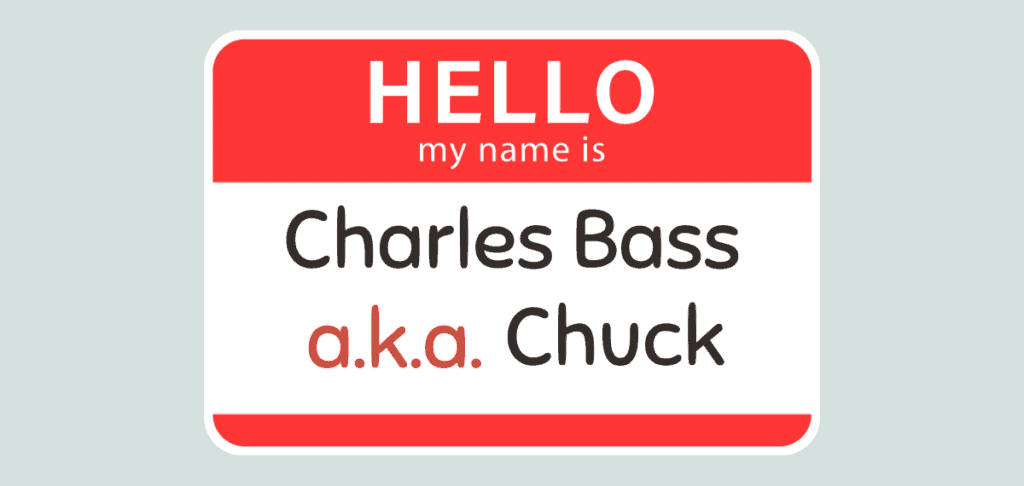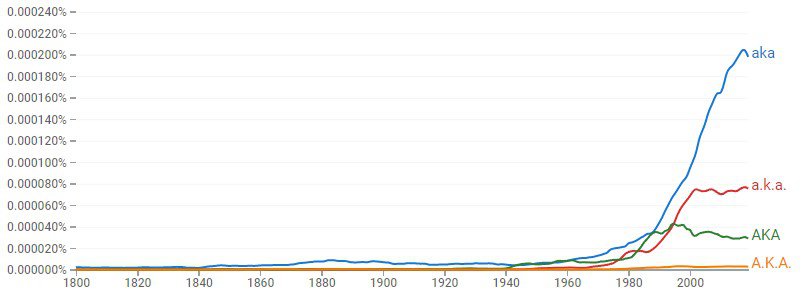Aka or a.k.a means “also known as.” This acronym is commonly used to reference a person’s alias, pseudonym, or nickname. You can write it in all lowercase (aka), all uppercase (AKA), or with periods (a.k.a.). Whichever style you pick, remember to stay consistent in your writing.
An acronym is an abbreviation formed from the initial letters of other words. While some acronyms morph into standalone words themselves (e.g., NASA or laser), others, like aka, are pronounced by enunciating each letter.
An abbreviation is a shortened version of a word or phrase that has been generally accepted as a replacement for the full form. In fact, many people are unaware of what familiar acronyms may even stand for.
Continue reading to learn the origins of “aka,” its appropriate usage, and to view it in action across various examples.
What Does AKA Mean?
The terms a.k.a. and aka are abbreviations for the phrase also known as. Most often used to describe a person’s aliases, pseudonyms or nicknames, a.k.a. and aka may also be used when describing another name for a place or object.
The Evolution of AKA

When the phrase also known as was first abbreviated, the letters were separated by periods, signaling that this was indeed an abbreviation and not a word in its own right. As a.k.a. became more commonly used, the periods within the abbreviation were dropped. In fact, aka is widely preferred over a.k.a and even the Merriam-Webster and Oxford English dictionaries list it as aka within their example sources. It also doesn’t resemble any other common English word so it works well as a standalone when used as aka.
You may find some professors or writing instructors prefer one way over another, and in that situation, always do what your instruction dictates for assignments or work. Even MLA and APA formatting doesn’t specifically specify one over the other and accepts either use – allowing writing instructors to dictate what they prefer. But for personal use, you can use whichever you are most comfortable with.
You can see its usage over time in this Ngram:

How to Pronounce AKA
Whether you are reading a.k.a or aka, it is pronounced the same way. The pronunciation is ay-kay-ay and enunciates the three letters separately and not as one word, which means it is not an acronym but just an abbreviation.
How to Use AKA
We’ve established that you can use both abbreviations either with or without periods and there is no one correct answer. But, did you know you can use either capital or lowercase letters? As stated previously, either is considered correct, but stay consistent with its use.
AKA Sentence Examples
As mentioned, you have quite a few options to choose from when determining which is your go-to preference. Whether you use A.K.A, AKA, a.k.a, or aka you can’t go wrong unless you decide to intermix them. Take a look at these examples to see AKA in use:
In these days of every-man-for-himself-ism, the guy who takes over is the one who isn’t afraid to break the rules and stand out—like Steven Yeun (a.k.a. Glenn on The Walking Dead), dressed here in the season’s most sophisticated, crisply tailored, workplace-ready tweed suits. (GQ Magazine)
The geniuses behind Saturday’s SNL episode invited “America’s Dad”—A.K.A. Tom Hanks—into our homes to help calm us down by adding some humor to it all. (Glamour Magazine)
Kimberly J. Brown, AKA Marnie Cromwell, did you a major solid and is letting you in on what one of the series’ most iconic villains, Kal, is up to 15 years later. (Seventeen Magazine)
When Not to Use AKA
Although it may be fairly obvious when you can use the abbreviation, there are some hard and fast rules of when NOT to use it in academic writing. For informal writing, it is acceptable for use in a variety of situations, as explained above, but you need to take care when sticking to more technical publications. What’s not okay in academic contexts is the informal use of aka to introduce an ad-hoc alternative term purely to describe/characterize something – such as, for example:
Houston’s new Astrodome, aka. the Eighth Wonder of the World. ( This Day in Sports)
In Conclusion
If you have ever been a bit stressed about the use of aka and its proper form, you don’t have anything to worry about as all forms are generally accepted. However, since even well-published dictionary sources use the aka style, you might want to follow suit. Be sure to share to help anyone else who might be stressing!
Enjoyed reading about this abbreviation? Check out some others we covered:
